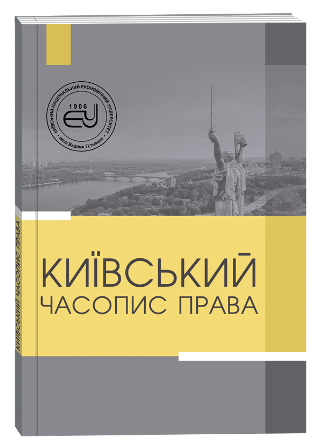SCIENTIFIC GENESIS OF RESEARCH ON THE PROSECUTOR’S POWERS IN THE FIELD OF CONTROL OVER THE COMMISSION OF A CRIME: EVOLUTION OF DOCTRINAL APPROACHES AND LAW ENFORCEMENT PRACTICE
DOI:
https://doi.org/10.32782/klj/2025.1.27Keywords:
prosecutor, criminal procedure, control over the commission of a crime, covert investigative (detective) actions, admissibility of evidence, court practiceAbstract
The article is devoted to the study of the scientific genesis of the prosecutor’s powers in the area of control over the commission of a crime. The author analyzes the evolution of doctrinal approaches to defining the role of the prosecutor in criminal proceedings, outlines the key stages of development of his/ her powers in the context of ensuring the legality of law enforcement actions, and also considers the main problems of law enforcement practice. The author reveals the main approaches to the interpretation of control over the commission of a crime in legal doctrine and criminal procedure. It is determined that historically, the role of the prosecutor in this aspect has undergone significant changes: from passive supervision of the legality of investigative actions to active participation in the process of control over the commission of a crime, including decision-making on the legality and appropriateness of such measures. Particular attention is paid to international standards in the field of criminal prosecution and the case law of the European Court of Human Rights, in particular, the prohibition of provocation of a crime and the criteria for the admissibility of evidence.The author also highlights the legislative aspects of control over the commission of a crime in accordance with the provisions of the Criminal Procedure Code of Ukraine, in particular, Part 2 of Article 271 of the CPC, which defines the limits and restrictions on such actions. The author analyzes the case law, including the decisions of the Supreme Court, which establish the criteria for assessing the admissibility of evidence obtained as a result of control over the commission of a crime. The author concludes that there is a need to improve the mechanism of prosecutorial supervision over covert investigative (detective) actions, which should help to increase the effectiveness of criminal prosecution and at the same time ensure compliance with legal guarantees. The results of the study can be used for further development of scientific approaches to determining the role of the prosecutor in the field of control over the commission of a crime, as well as for improving law enforcement practice in the context of criminal procedure law of Ukraine.
References
Зеленецький В. С. Повноваження прокурора у кримінальному провадженні: проблеми теорії та практики. Вісник кримінального судочинства. 2022. № 1. С. 34–47.
Горох О. Г. Контроль за вчиненням злочину: правові засади та проблеми правозастосування. Юридична наука. 2021. № 4. С. 89–102.
Сачко О. В. Процесуальні гарантії під час негласних слідчих (розшукових) дій: прокурорський нагляд. Часопис Національного університету «Острозька академія». 2020. № 2. С. 112–125.
Кримінальний процесуальний кодекс України : Закон України від 13.04.2012 № 4651-VI. Відомості Верховної Ради України. 2012.
Підручний М. В. Правові основи прокурорського нагляду за дотриманням законності при контролі за вчиненням злочину. Монографія. Київ: Юрінком Інтер, 2020. 278 с.
Воронін І. Л. Використання матеріалів контролю за вчиненням злочину у кримінальному судочинстві. Збірник наукових праць Харківського національного університету внутрішніх справ. 2023. № 1. С. 56–72.







